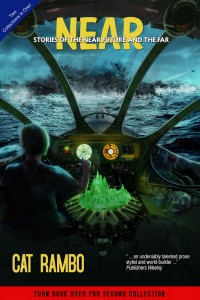-
Get Fiction in Your Mailbox Each Month
Want access to a lively community of writers and readers, free writing classes, co-working sessions, special speakers, weekly writing games, random pictures and MORE for as little as $2? Check out Cat’s Patreon campaign.
This site is a participant in the Amazon Services LLC Associates Program, an affiliate advertising program designed to provide a means for sites to earn advertising fees by advertising and linking to Amazon.com.
Tag Archives: clarion west
Advice for Attending a Writing Workshop
A student wrote in to let me know they’d made it into Odyssey, huzzah, and asked if I had any advice about attending a workshop. As a matter of fact I do. Like many things in life, you get more out of a workshop if you’re willing to invest a little effort beforehand, during, and afterward.
I went through a number of workshops in college at both the undergraduate and graduate level, but the place where I learned the most was Clarion West, a six week workshop in Seattle. My instructors were Octavia Butler, Andy Duncan, L. Timmel Duchamp, Connie Willis, Gordon van Gelder, and Michael Swanwick; my classmates included Ann Leckie, E.C.Myers, Rashida Smith, and Rachel Swirsky, among others. If you read a lot of F&SF, you may recognize many of those names and realize how incredibly privileged I was to be part of that year.
Continue reading
Writing Outside One’s Comfort Zone
We’ve all got a comfort zone, the place where we can function easily, where we know what to expect. It’s a nice place. It’s…well, it’s COMFORTABLE. Hence the name. It would be easy to stay there all the time.
But for writers, I think it’s very important to go outside on a regular basis. For one thing, your characters are going to be outside their comfort zones, being challenged, tested, thwarted, more often than not, because one thing about comfort zones is that they can be pretty darn boring to read about. Who wants a character for which everything goes right? (This is, I will argue, why the Richie Rich comic books were pretty darn bland.) How can you write a character outside their comfort zone if you don’t know what it’s like?
Continue reading
Posted in Writing
Tagged art, clarion west, comfort zone, self-improvement, teaching writing, writing, writing F&SF
5 Comments
You Should Read This: Ancillary Justice by Ann Leckie
Ancillary Justice by Ann Leckie is a fabulous space opera with an unusual protagonist whose struggle will pull the reader in. It is, alas, not a particularly long book, and I could have read at least twice more the length happily.
I must admit to an extra hint of pride in this book’s appearance here, because Ann was a member of my Clarion West class back in 2005, when she was first wowing all of us with her Radchi universe. Ann and I also know each other through SFWA and our shared agent, Seth Fishman.
Continue reading
Posted in you should read this
Tagged ancillary justice, ann leckie, clarion west, SFWA, you should read this
1 Comment
Self Promotion and Career Building: What I Told the Clarion West 2013 Class
Yesterday I spent a pleasant chunk of time talking to the Clarion West 2013 students, along with Django Wexler. Django and I were the “mystery muses,” a Friday feature for the CW students where people come in to chat about a specific aspect of the writerly life. Django spoke well to the experience of having one’s first major book come out, since his book (which I have read and heartily recommend) The Thousand Names just came out. He let us all know (to mass disappointment) that it doesn’t lead to being booked on the Leno or Daily Show or lavish book tours, though he did get to go to ComicCon.
Continue reading
Clarion West Writeathon: 2013 Edition
This year, I’m again participating in the Clarion West Writeathon. A lot of people are driving pledges with backer incentives. Here’s mine: I plan to complete one story each week. At the end of the six weeks, all backers will … Continue reading
Folly Blaine reads “Zeppelin Follies” from Near + Far
The excellent Folly Blaine reads one of the stories from Near + Far, “Zeppelin Follies.”
Continue reading
Posted in near+far
Tagged clarion west, folly blaine, l. timmel duchamp, screwball comedy, writing desperation, zeppelin follies, zeppelins
2 Comments





